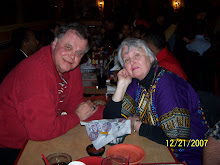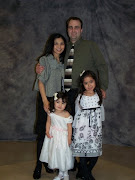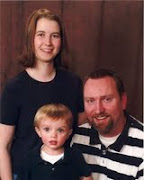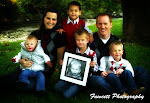Finally, Pat contributes to "our blog."
It was an unusually warm day in Levan, Utah, that summer when Samuel Elmer
Pierce, my grandfather, was born August 25, 1871, to George Henry
Pierce and Sarah Skinner Pierce. His father and mother welcomed baby
number eight into their humble home 10 miles southeast of town. They
had a 2-room log cabin on their 320 acre homestead called 10 mile creek.
They had a 1 room house in town where one of the older girls, Sarah or
Phoebe, would move into town so the younger kids could attend school
during the winter months.
Sam was big for his age with deep blue eyes and dark brown hair. He
would often play with his brother, Sylvester, 2 years younger, when
chores were done. There were lots of chores: plowing, weeding, feeding
of animals, taking care of fruit trees, and milking twice a day.
Usually, the Pierce family kept 10 cows, 20 pigs, and 200 roosters.Their
garden and orchards took up 2 acres, and they used the other acres for
raising wheat, and breeding cattle.
.
Sam's father was in an accident which left him crippled at an age when
the children were young. His mother, Sarah, would have the older boys,
George and Brigham, plow with 2 yoke of oxen and a pair of mules, while
she would yoke up 2 cows and haul wood with her nursing baby on her lap.
She would chop the heads of rattlesnakes off with a stick
Once, when Sam and Sylvester were putting up hay in the barn loft, they
lost control of the derrick and Sam's leg was hurt badly. He healed up
but carried a scar for the rest of his life.
The
summer Sam was 14 years of age, life got too boring on the rattlesnake
infested homestead. Sam was tired of plowing, hauling water, and milking
cows. In spite of the fact that his father had established the first
dancing school in the valley and Saturday nights were something special
for young folks. Sam wanted more. He wanted to travel. He wanted to see
some big cities - Chicago, Cincinnati, and New York. He left home one
early morning after milking the cows. He packed some left over sour
dough biscuits and some of his mother's cheese, and some oats for his
horse.
After a few weeks, Sam came across Buffalo Bill's Wild West show with a
cast of 2,000 men, women, and Indians, plus numerous animals.
Organizers of the tour had plans to visit all the major eastern cities
giving people a glamorous peek at life in the wild west. It was a dream
come true for Sam. His working on the ranch had given him plenty of
muscles on his 6 foot frame. He knew how to take care of animals. When
he asked about a job, they never even asked his age. They put his
muscles and sense of balance to work putting up the tents for the show
and then pulling the tents down, packing up the animals, and equipment,
and moving on for the next show location. The company would camp for the
night, and then bright and early set up the tents again. Mid-day they
would have a parade through the town to attract an audience. A few of
the show girls would ride their ponies, some of the buffalo would be
herded down the street as well as elk, antelope, deer, and long horned
steers. Indians in war paint and feathers would ride their horses as
well.
While Sam watched the performances of the gun shooters reenacting the
old west in a dramatic way, he got an idea that he would show them that
he could shoot as well as any of them. He had the ability to freeze his
muscles when he lined up a target. He could look away for a full minute
and then pull the trigger with uncanny accuracy. Sam was soon showing
his skills with a pair of matching pistols. He would toss two silver
dollars in the air and draw and shoot through them.
When Billy the Kid took in a performance, he
was taken with Sam's pistols. He took one of them and gave Sam his
pistol. Sam didn't object, Billy's reputation had proceeded him. When
Sam heard that Billy had died in a gun battle, he scoffed and said,
"They must have shot him in the back while he slept. He was quicker than
that." It turned out that Sam was right. Billy was killed in his sleep,
shot in the back.
When Buffalo Bill decided to tour Europe with his wild west show, Sam decided to return home to
Levan.
After 30 years of being a gypsy, he thought maybe it was time to say
hello to his family. George and Sarah had given him up for dead years
ago and they couldn't believe it was really was him. Only after he
pulled up his pant leg and showed them the scar of his hay derrick
accident with Sylvester did they believe him.
Soon after returning home, he met Alice Irene Christensen, a petite
5' tall woman with big brown eyes and dark hair. They were married
August 12, 1914, and settled in
Salina, Utah. A baby boy, Elmer was born in 1917. Helen arrived 2 years later, and Spencer joined the family in 1921.
When Sam heard that the Utah Fish and Game Department were offering a
$50. bounty for bear that had become such a nuisance to the farmers by
killing their livestock, he was challenged. He trapped 92 bear the
first year. The Fish and Game looked at his bill - $4,600. That would
nearly bankrupt them. They decided to hire him and he spent much of the
next 30 years in the hills of southern Utah.

| Pat shows off one of Sam Pierce's bear traps. She recalls her family driving out to Sam's house after his
death, and someone was there burnng most of Sam's junk and other belongings, including dozens of bear
skins. Luckily, he didn't burn the Singer treadle sewing machine, because Bridget now has it. |
Once while in the hills, a cougar dropped from an overhead branch,
narrowly missing Sam, but killing his horse. He quickly dispatched the
cougar, and spent a long time walking home with his saddle of his
shoulders. He was always careful to rub his body with sagebrush so that
animals could not detect his human smell.
Sam had quite a sense of humor. One time while visiting his brother
Sylvester and his wife, Violet, he said noticing Violet's cat walking
across the top of a fence, "Vi, I think that cat's tail is too long."
He took out his pistol and shorten the tail three inches. Violet was
furious with him for weeks.
Sam would often tell of another time when he visited Sylvester and
Violet's home. He motioned for Violet to come outside saying, "I've got
something to show you." She gasped at the two bear cubs in the back of
his wagon, sitting upright like well trained dogs. Sam explained that
he had found them wandering the hills and wanted to feed them until they
were older and could be released in the mountains.
Violet remarked that Sam would be the death of her yet, frightening her once again.
Sam
liked to shoot the breeze with the patrons of the tavern in town. Once,
Irene sent their son Elmer to fetch Sam for supper. Elmer came in the
door of the tavern, and watched while Sam took a mirror, looked over
his shoulder at a wanted poster, aimed his pistol, put down the mirror,
and then fired straight through the eye of the man on the poster. He
then motioned for Elmer to come and gather up the silver dollars that
had been laid down on the bar as wagers that he couldn't perform the
feat.Sam used his hat to contain the dollars. It was more that would fit
in his pockets and Elmer's combined.
When Sam took his family to the carnivals, the man offering prizes
for shooting a target or throwing a ball at a target, would just
say."What prize do you want. I might as well save the ammunition."
Sam
remained physically strong his entire life. At age 70 he could put his
feet on a chair - put his head on another chair - support his weight
with abdominal muscles and have Irene sit on his stomach suspended
between the two chairs.
I remember Sam always giving me a silver dollar for every year I was
old, as well as a new rope for a swing for my birthday. I thought he
was very handsome - tall, salt and pepper thick hair, and big beautiful
dark blue eyes.
I remember how he would pour lots of gravy on his mashed potatoes,
take a green onion and slice it thin with his pocket knife, and then
cover everything with a large dose of pepper. I remember big sugar
cookies from the bakery in town - at least four or five inches across. I
remember running through the six sheds in the back yard of their
Salina
home with bear skin rugs hanging all about. I still have Sam's bear
traps, now covered with rust instead of sagebrush as well as pleasant
memories.









